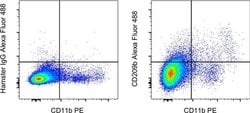Learn More
Invitrogen™ CD209b (SIGN-R1) Monoclonal Antibody (eBio22D1 (22D1)), Alexa Fluor™ 488, eBioscience™
Armenian Hamster Monoclonal Antibody
$455.00
Specifications
| Antigen | CD209b (SIGN-R1) |
|---|---|
| Clone | eBio22D1 (22D1) |
| Concentration | 0.5 mg/mL |
| Content And Storage | 4°C, store in dark, DO NOT FREEZE! |
| Applications | Flow Cytometry |
| Catalog Number | Mfr. No. | Quantity | Price | Quantity & Availability | |||||
|---|---|---|---|---|---|---|---|---|---|
| Catalog Number | Mfr. No. | Quantity | Price | Quantity & Availability | |||||
53-209-382

|
Invitrogen™
53209382 |
100 μg |
Each of 1 for $455.00
|

|
|||||
Description
Description: The eBio22D1 monoclonal antibody reacts with mouse SIGNR1 (CD209b). SIGNR1 is a type II transmembrane C-type lectin that was identified in a search for mouse homologues of human DC-SIGN. It is expressed at high levels in splenic marginal zone macrophages and lymph node medullary macrophages, where it functions to uptake dextran polysaccharides, including the capsular polysaccharide of Streptococcus pneumoniae. It has also been demonstrated that SIGNR1 physically associates with TLR4/MD2, and it has been suggested that this association plays a role in recognition of LPS. Furthermore, recently it has been shown that SIGNR1 deficient mice have a defect in catabolism of the complement component C3, and that SIGNR1 binds directly to the complement C1 subcomponent, C1q to assemble a non-conventional C3 convertase. The eBio22D1 monoclonal antibody does not cross-react with the closely related SIGNR1, SIGNR2, SIGNR3 or SIGNR4. Applications Reported: This eBio22D1 antibody has been reported for use in flow cytometric analysis. Applications Tested: This eBio22D1 antibody has been tested by flow cytometric analysis of mouse splenocytes. This may be used at less than or equal to 1.0 μg per test. A test is defined as the amount (μg) of antibody that will stain a cell sample in a final volume of 100 μL. Cell number should be determined empirically but can range from 10^5 to 10^8 cells/test. It is recommended that the antibody be carefully titrated for optimal perfo...
SIGNR1 is a type II transmembrane C-type lectin that was identified in a search for mouse homologues of human DC-SIGN. It is expressed at high levels in splenic marginal zone macrophages and lymph node medullary macrophages, where it functions to uptake dextran polysaccharides, including the capsular polysaccharide of Streptococcus pneumoniae. It has also been demonstrated that SIGNR1 physically associates with TLR4/MD2, and it has been suggested that this association plays a role in recognition of LPS. Furthermore, recently it has been shown that SIGNR1 deficient mice have a defect in catabolism of the complement component C3, and that SIGNR1 binds directly to the complement C1 subcomponent, C1q to assemble a non-conventional C3 convertase.Specifications
| CD209b (SIGN-R1) | |
| 0.5 mg/mL | |
| Flow Cytometry | |
| Alexa Fluor 488 | |
| Armenian Hamster | |
| RUO | |
| PBS with 0.09% sodium azide; pH 7.2 | |
| Q8CJ91, Q91ZX1 | |
| 170786, 69165 | |
| Primary | |
| Affinity chromatography |
| eBio22D1 (22D1) | |
| 4°C, store in dark, DO NOT FREEZE! | |
| Monoclonal | |
| Liquid | |
| IgG | |
| Mouse | |
| Cd209a | |
| 1810030I22Rik; CD209; CD209 antigen-like protein A; CD209 antigen-like protein B; Cd209a; CD209a antigen; CD209a molecule; Cd209b; CD209b antigen; CDSIGN; CIRE; DC SIGNR1; Dcsign; DC-SIGN; DC-SIGN1; DC-SIGNR1; DC-SIGN-related protein 1; Dendritic cell-specific ICAM-3-grabbing non-integrin; MGC130443; mSIGNR1; OtB7; SIGNR1; SIGN-R1; SIGNR5 | |
| Cd209a, Cd209b | |
| Antibody |
The Fisher Scientific Encompass Program offers items which are not part of our distribution portfolio. These products typically do not have pictures or detailed descriptions. However, we are committed to improving your shopping experience. Please use the form below to provide feedback related to the content on this product.
